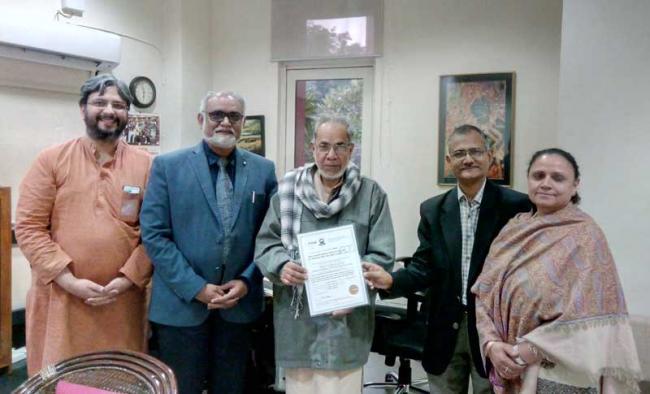
India's National Cultural Audiovisual Archives becomes the world’s First Trusted Digital Repository
New Delhi, Mar 20 (IBNS): The National Cultural Audiovisual Archives (NCAA) project, under the Union Ministry of Culture, and implemented by Indira Gandhi National Centre for the Arts (IGNCA) has been certified as the world’s first Trusted Digital Repository.
The Ministry in a release on Tuesday said that the certification -- ISO 16363:2012 standard -- was granted by Primary Trustworthy Digital Repository Authorisation Body Ltd (PTAB) of United Kingdom.
PTAB was the first in the world to be accredited to perform ISO 16363 Audit and Certification.
Leveraging this achievement, the plan for the next phase is to integrate about three lakh hours of audiovisuals material, a corpus estimated based on a scoping survey conducted in 25 cities across the country, on this platform over the next five years, the Union ministry said in its release.
The Central government's Minister of State for Culture (Independent Charge) and Environment, Forest & Climate Change, Dr. Mahesh Sharma said, “I congratulate IGNCA for this remarkable achievement. This will boost the accessibility of the NCAA up to the remotest corner of the country and help preserve India’s rich culture throughout its length and breadth.”
The primary objective of the NCAA is to identify and preserve the cultural heritage of India available in audiovisual form through a process of digitization and making it accessible to the people, the ministry said.
By March 2018, a corpus of 30,000 hours of unpublished, non-commercial audio & video recordings will be made online at http://ncaa.gov.in/repository, out of which approximately 15,000 hours are already hosted online along with contextual metadata, representing the cultural diversity of India in the broadest sense.
Over 23,000 hours of unpublished audiovisual recordings have already been digitized.
NCAA pilot digital repository was developed in collaboration with the Centre of Excellence for Digital Preservation by C-DAC, Pune.
NCAA digital repository is established with and powered by Digitalaya developed by C-DAC Pune in compliance with Open Archival Information System (OAIS) Reference Model ISO 14721:2012.
t present, according to the ministry, NCAA has 31 Partnering Institutions from across the country, covering 11 governmental and 10 non-governmental cultural organisations.
The digitization and metadata standards followed by the Project are in parity with international standards within the overall framework of the OAIS model. The digitization standards are in concordance with those prescribed by the International Association of Sound & Audiovisual Archives (IASA) and the metadata schema is extended Dublin Core, followed by galleries, libraries, archives and museums worldwide
Indira Gandhi National Centre for the Arts was set was launched in 1985 as a premier research institute dedicated to holistic understanding and expression of Indian arts in their inter and multi-disciplinary nature.
One of the principal aims of the centre is to serve as a major national resource centre for the arts.
The IGNCA has been designated by the Central government as the nodal agency for a data bank on art, humanities and cultural heritage.
The Centre has also been identified by UNESCO as nodal agency for the development of regional databases for South and South East Asian countries on art, cultural heritage and life-styles through the application of state-of-the-art technologies for standardization, exchange and dissemination of data.
Image: IGNCADelhi/Twitter
Support Our Journalism
We cannot do without you.. your contribution supports unbiased journalism
IBNS is not driven by any ism- not wokeism, not racism, not skewed secularism, not hyper right-wing or left liberal ideals, nor by any hardline religious beliefs or hyper nationalism. We want to serve you good old objective news, as they are. We do not judge or preach. We let people decide for themselves. We only try to present factual and well-sourced news.







